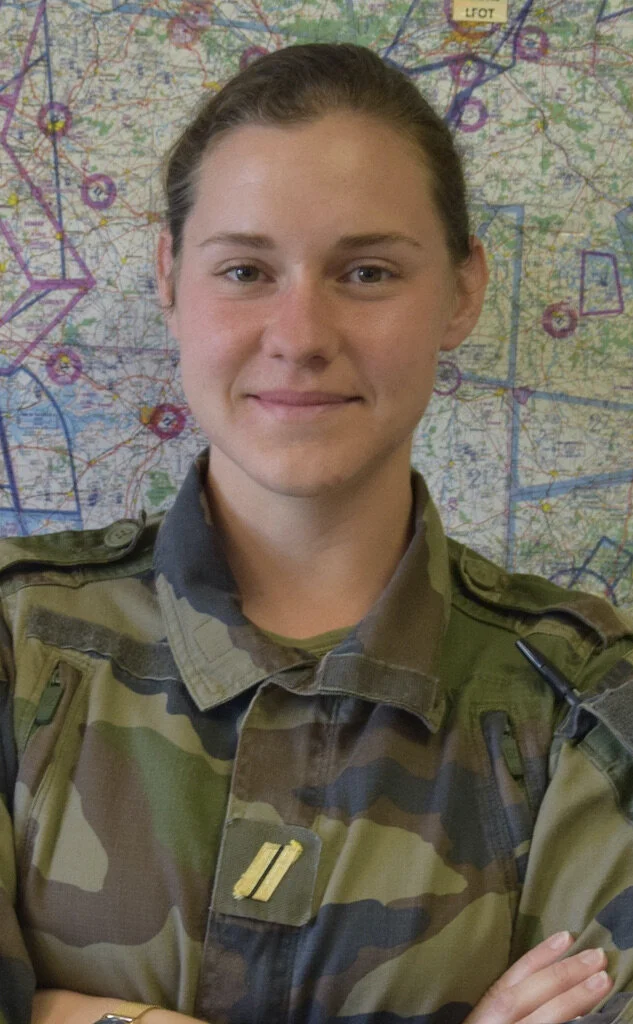Regimental Sergeant-Major Julie
Julie in front of flight maps. Photo credit: Lt. Lydie/French Army
Julie, a meteorologist in the 3rd combat helicopter regiment laughs when I ask her why she didn’t join either the air force or the navy. “The army was an obvious choice for me because my grandfather and my father were both career soldiers,” she explains. But she knew nothing about meteorology and it was the armed forces recruitment centre (CIRFA) in Strasbourg “that first introduced me to the idea of becoming a meteorologist”, the young Alsatian recounts. She followed up on their suggestion to spend a week in meteorological immersion to discover what the job was about and she was hooked!
““When you’re on deployment, it’s operational, there’s no room for error””
Having passed a scientific baccalaureate at the military secondary school at Saint-Cyr l’École (near Versailles and nothing to do with the military academies at Saint Cyr Coëtquidan which is where army officer cadets are trained), she was not put off by the academic content of a meteorologist’s training programme.
After spending eight months of basic military training at the non-commissioned officers school at Saint-Maixent, Julie followed up with 18 months at the National School of Meteorology in Toulouse, south-west France. The student body is largely made up of civilians who need to pass a competitive exam to be admitted but there is a specific stream for the military. Julie studied atmospheric physics, electromagnetic waves, probabilities, oceanography; she did some English and more maths; she learnt to observe, measure, forecast; to understand satellite meteorology; to analyse waves and the swell; she did statistics. It’s an extremely academic course “that few military personnel know about,” she explains.
At the end she earned a Meteorological Technician’s Certificate. “The difference with the civilians who get their technicians’s certificate after two years of studies is that we only do 18 months and for the six remaining months we have specific military training with whatever regiment we’ve been assigned.” She adds that after eight years of practice, and another training course, she’ll have the equivalent of a university degree in operational forecasting!
Julie behind her bank of weather screens. Photo credit: Lt. Lydie/French Army
Julie signed her first five-year contract in October 2015 as a non-commissioned officer and has just signed up again until 2026. For the time being she’s not interested in passing the competitive exams to become an officer “because I’d not be able to keep my speciality,” and she really likes it! So she’s considering the new competitive exam for “officers with a speciality”, introduced in 2020 for non-commissioned officers with 10 years of experience that they can attempt until they are 45… which Julie will be nowhere near when she can try in four or five years time!
For the moment she’s very happy in the army which she considers a “second family.” It’s true that she was brought up in a military family “but now that I’m on the inside, working, there’s the professional aspect that I was obviously unaware of when I was a child.” She appreciates the requirement for “rigour, reactivity and respect for the uniform.”
Each of the French Army’s three helicopter regiments (the 1st, the 3rd and the 5th) has a team of four meteorologists. “We almost keep office hours,” she smiles. “We work either from 06:00 to 15:00 or from 08:00 to 17:00 and are only very occasionally called upon to work at night.” Julie explains that in France her work is fairly “routine because we are essentially weather forecasting for training flights.” But, during her four month deployment to Mali “which I adored”, her work “had nothing to do” with her daily routine back home. First there was the tropical weather that she learnt to forecast during a two week training course prior to her departure. “In the summer in Mali it’s the rainy season and very big storms are an almost daily occurrence so there needs to be two meteorologists on the ground, whilst for winter deployments, during the dry season, there’s only the need for one meteorologist,” she explains. Julie really loved the increased responsibilities she had on deployment. “You know why you’re there. When you’re on deployment, it’s operational, there’s no room for error and that’s what makes the work more interesting than in France. One feels useful because the stakes are not the same and I really want to go back there,” she exclaims “even if it’s a little hard being far from one’s family.” Her husband is in the same regiment and her family is used to the military life so they understand.
What are the skills needed to be an army meteorologist? Her reply might come as a surprise: “You have to be curious.” She elaborates: “to forecast the weather you have to dig up a lot of information. For example, I have around 100 computer programmes at my disposal and I mustn’t always consult the same weather maps.” She adds that being patient is also useful. “You can’t go faster than the weather,” she smiles. And you have to “know how to adapt to every situation.”





